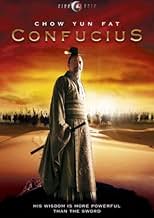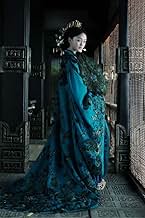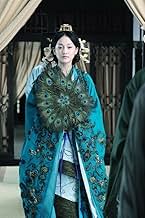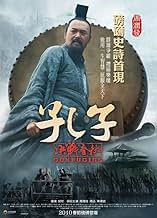AVALIAÇÃO DA IMDb
6,1/10
4 mil
SUA AVALIAÇÃO
Adicionar um enredo no seu idiomaThe life story of the highly-influential Chinese philosopher, Confucius.The life story of the highly-influential Chinese philosopher, Confucius.The life story of the highly-influential Chinese philosopher, Confucius.
- Prêmios
- 6 vitórias e 14 indicações no total
Lu Yao
- The Ruler of Lu
- (as Yao Lu)
Dongyan Ma
- Ran Qiu
- (as Ma Qiang)
Enredo
Você sabia?
- ConexõesFeatured in Estrenos Críticos: (Piloto) Bestezuelas, Piratas del Caribe 4... (2011)
- Trilhas sonorasYou Lan Cao
Music by Ou Ge Deng (as Ou Ge)
Lyrics by Foreland Cultural Salon
Performed by Faye Wong
[Theme Song]
Avaliação em destaque
This is the film that the film bureau of the PRC's State Administration of Radio, Film and Television wanted to pit against Avatar? Really??? This film wouldn't even last five seconds against Judge Judy.
Here is what I learned from the film: Confucius would have made a perfect litigant for Judge Judy's binding arbitration, 'make belief' court, being sued by his wife for back child support and breach of contract by his 'students.' The film portrayed Confucius as a 'bum'--as Judge Judy would say--who abandoned his wife and children after becoming unemployed. He then meandered all over the feudal kingdoms of ancient China, turning down job after job for the next few decades or so while taking on more students to service him, even when he had no funds or resources to see to their education. In his defense, Confucius say: "I want to change things!" However, other than the fairly common desire to see an end to the perpetual conflicts between warring principalities that characterized the Spring and Autumn Period, it is not entirely clear in the film what specific changes he wanted to affect or how his teachings were going to bring about those changes. In fact, other than dispensing one liner fortune cookie wisdom, when did he actually 'teach' in this film?
Now let's put this film into context. As the PRC's communist ideological framework crumbles under the reality of its free market political and economic reforms, the post-socialist Chinese state 're-discovers' once banished Confucian ideals as a way to attempt to re-align its political authority with a moral authority, re-unite the disparate social and political elements of Chinese society, and distinguish the uniqueness of its modernization from Western industrialized countries. But even as a propaganda film meant to promote social values that would reconcile the PRC's authoritarianism with market capitalism, this film fails. It fails because the story was badly scripted and delivered by an over-dramatic acting style reminiscent of the last generation of period Chinese films. It's not smart or stylish, but is desperately trying to be in order to reach a new generation of Chinese movie-goers who would rather be stupefied by films like Avatar instead of being stupefied by films like this.
Two stars, for the women in the film - the only aspect of this film that was not profoundly irritating.
Here is what I learned from the film: Confucius would have made a perfect litigant for Judge Judy's binding arbitration, 'make belief' court, being sued by his wife for back child support and breach of contract by his 'students.' The film portrayed Confucius as a 'bum'--as Judge Judy would say--who abandoned his wife and children after becoming unemployed. He then meandered all over the feudal kingdoms of ancient China, turning down job after job for the next few decades or so while taking on more students to service him, even when he had no funds or resources to see to their education. In his defense, Confucius say: "I want to change things!" However, other than the fairly common desire to see an end to the perpetual conflicts between warring principalities that characterized the Spring and Autumn Period, it is not entirely clear in the film what specific changes he wanted to affect or how his teachings were going to bring about those changes. In fact, other than dispensing one liner fortune cookie wisdom, when did he actually 'teach' in this film?
Now let's put this film into context. As the PRC's communist ideological framework crumbles under the reality of its free market political and economic reforms, the post-socialist Chinese state 're-discovers' once banished Confucian ideals as a way to attempt to re-align its political authority with a moral authority, re-unite the disparate social and political elements of Chinese society, and distinguish the uniqueness of its modernization from Western industrialized countries. But even as a propaganda film meant to promote social values that would reconcile the PRC's authoritarianism with market capitalism, this film fails. It fails because the story was badly scripted and delivered by an over-dramatic acting style reminiscent of the last generation of period Chinese films. It's not smart or stylish, but is desperately trying to be in order to reach a new generation of Chinese movie-goers who would rather be stupefied by films like Avatar instead of being stupefied by films like this.
Two stars, for the women in the film - the only aspect of this film that was not profoundly irritating.
- dontspamme-11
- 4 de mar. de 2010
- Link permanente
Principais escolhas
Faça login para avaliar e ver a lista de recomendações personalizadas
Detalhes
- Data de lançamento
- País de origem
- Central de atendimento oficial
- Idioma
- Também conhecido como
- A batalha pelo império
- Locações de filme
- Empresas de produção
- Consulte mais créditos da empresa na IMDbPro
Bilheteria
- Orçamento
- US$ 22.000.000 (estimativa)
- Faturamento bruto mundial
- US$ 4.501.039
- Tempo de duração2 horas 5 minutos
- Cor
- Mixagem de som
- Proporção
- 2.35 : 1
Contribua para esta página
Sugerir uma alteração ou adicionar conteúdo ausente

Principal brecha
By what name was A Batalha pelo Império (2010) officially released in Canada in English?
Responda























